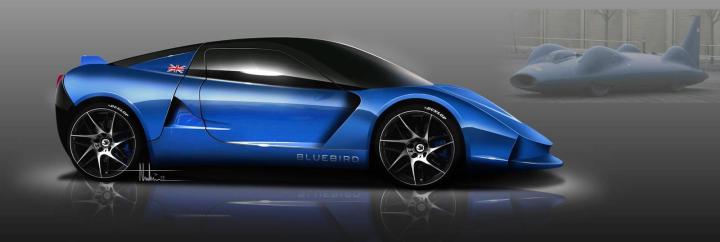
With a little luck, a famous land speed record car could be reborn as a road-legal electric sports car.
Unfortunately, though, the Bluebird DC50 seems to be out of luck. It was supposed to debut at the upcoming Sustainable Motor Expo, but the car’s launch has been pushed back to April 2014, GTSpirit reports. We’re hoping this doesn’t spell the demise of the little EV sports car because, on paper, it has an impressive pedigree.
The DC50 pays tribute to Bluebird’s past land and water speed record vehicles. Its name signifies the 50th anniversary of Donald Campbell’s 1964 429 mph land speed record in the Bluebird CN7 and water speed record of 276.33 mph in the Bluebird K7. The DC50’s creator, Don Wales, is Campbell’s nephew.
The DC50 won’t be breaking any land speed records, but it should be pretty brisk.
Bluebird will reportedly build versions with 240 horsepower, 280 hp, and 360 hp. It will get from 0-60 mph in “less than six seconds” and reach a top speed of 140 mph. Bluebird says it will weight under 2,200 pounds and have a 45/55 front/rear weight distribution.
However, the DC50 wouldn’t fare well in a drag race against a Tesla Roadster Sport or the upcoming Detroit Electric SP:01, both of which will reach 60 mph in 3.7 seconds. The Bluebird does have a 10 mph top speed advantage over the Tesla, but Detroit Electric says its car will do 155 mph.
Detroit Electric is having problems of its own, though, which means the DC50 has a realistic chance of being the only electric sports car in production if it can get out of the factory doors next year. If it ever does see the production floor, however, only 50 will be made.
Editors' Recommendations
- DeLorean could could make a comeback as an electric car
- The Porsche Taycan could pave the way for electric two-seater sports cars


